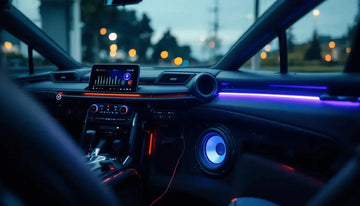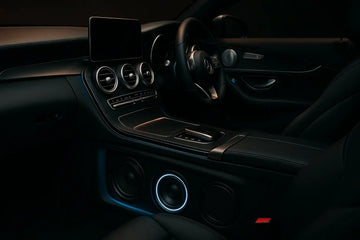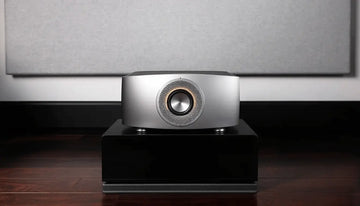Key Highlights
- Enhance your driving experience with premium car speakers that deliver powerful and immersive sound.
- Factory-installed speakers often lack the fidelity and depth of premium options.
- Consider factors such as speaker type, power handling, sensitivity, and material when choosing new speakers.
- Proper installation ensures optimal sound quality. Decide between professional installation or DIY with the right tools and expertise.
- Compatibility with your car stereo system and vehicle model is essential for seamless integration.
Introduction
Elevating your driving experience goes beyond just a nice interior and good handling. It's about making a rich sound environment that changes every trip. If you still use the stereo and speakers that came with your car, you are missing out on great sound quality. Getting new car speakers can greatly improve your time on the road, whether you listen to music casually or you are a serious audio fan. This complete guide looks at top car speaker systems. It will help you make smart choices to create the best audio experience in your car.
Why Upgrade Your Car Speaker System?
Factory-installed car speakers usually focus on saving money rather than providing great sound. This can make them sound dull, unclear, and unable to capture the full range of your favorite music. You deserve better sound, and upgrading your car speakers can help you achieve it.
High-quality car speakers use better materials and smart design to give you clear sound, a wider range of frequencies, and more volume without problems. Whether you're driving on the highway or through the city, spending money on a good car speaker system can really make your drive more enjoyable.
The Impact of High-Quality Sound on the Driving Experience
The effect of good sound quality on your driving experience is significant. When the audio is immersive, it can improve your mood, lower stress, and make long drives much more fun. With clear highs, rich mids, and deep bass, you can hear little details in your favorite songs that you might have missed before.
Good car audio systems do more than entertain; they also help keep drivers safe. With balanced sound, you will hear important sounds better, like navigation directions and emergency vehicle sirens. This awareness makes driving safer for you and everyone else on the road.
In the end, the best car audio setups can turn your car into a concert on wheels. Whether you love great sound quality or just want to have a better time on your daily commute, buying high-quality car speakers is a choice you'll be glad you made.
Understanding the Limitations of Factory-Installed Speakers
While the speakers you get from the factory may work fine for simple listening, they often do not provide a great sound experience. Car makers focus on saving money, which leads to lower-quality audio equipment.
These factory speakers usually use cheaper materials and do not have the advanced design found in better aftermarket speakers. This creates a big difference in sound quality. You might notice things like unclear bass, harsh high sounds, and not much variation in sound. This can make your favorite songs sound flat and lifeless.
When you upgrade your car’s audio system with better speakers, you will enjoy your music like never before. The difference high-quality speakers can make is impressive. They can turn your daily commute or road trip into a great audio experience.
Key Features to Look for in Premium Car Speakers
Choosing the right car speakers can be hard because there are so many options. To help you decide, look at some important features that fit your listening taste and budget. First, think about the type of speakers. Coaxial speakers are easy to use because they come all in one package. Component speakers are better if you want more choice in sound quality and clarity.
Next, check the power handling. You need to make sure the speakers can work well with your car stereo system. Sensitivity is also important. It shows how loud the speakers can get with the power they get. Finally, pay attention to the material and build quality. Good quality affects how long the speakers last and how well they perform over time.
Speaker Types and Their Advantages
One of the first choices you have when upgrading your car audio system is whether to pick component speakers or coaxial speakers. Each type has its own benefits and works well for different needs and tastes.
Coaxial speakers are often used in factory systems. They combine several parts – a woofer, tweeter, and sometimes a super tweeter – into one unit. This design makes them easy to install and is usually a good choice for those on a budget.
Component speakers are different. They separate the different drivers. This setup allows for better sound placement because you can put the tweeter where it will give the best high-frequency sound. Component speakers tend to give a more detailed and rich sound. They are great for audiophiles who want the best car audio experience.
Power Handling and Sensitivity Explained
When you choose car speakers, it’s important to know about power handling and sensitivity. This helps you make sure they fit your car stereo system and give the volume you want.
Power handling, measured in watts (RMS), tells you how much power a speaker can take before it has problems like distortion or damage.
Sensitivity is measured in decibels (dB). It shows how loud a speaker will get using a certain amount of power. Speakers with higher sensitivity produce more volume with less power. On the other hand, speakers with lower sensitivity need more power to sound as loud.
For the best results, match the power handling of your speakers with the output from your car stereo or external amplifier. Also, check the sensitivity rating based on how much power your stereo system can provide.
Material and Build Quality for Lasting Performance
Investing in good car speakers is about more than just great sound. It is also about lasting performance. The quality of the materials and how the speakers are made strongly affect how long they will last and how well they resist damage from the environment.
When looking for speakers, find ones that have a strong build. They should have sturdy frames and well-made cones. Materials like polypropylene or mica-injected woofers and silk dome tweeters not only help produce better sound but also last longer against wear and tear.
Using durable materials and careful craftsmanship means your investment will give you great audio for many years. This offers you good value and enjoyment over time.
Step-by-Step Guide to Choosing the Right Car Speakers
Navigating car speaker systems can feel tricky, but it can be easy if you follow a clear plan. First, look at your car's sound environment. Think about the size and shape inside your car, the material of the upholstery, and any soundproofing that’s there. These can change how sound travels and will affect which speakers you should choose.
Next, check your car stereo system. Find out its power output and features, like if it has built-in amplifiers or signal processors. This will help you pick the right speakers that work well with your stereo. Lastly, make sure your speakers fit your car model. Different cars have different speaker sizes and places where they are mounted. Look in your car's manual or use online guides to see what options will fit.
Assessing Your Car's Acoustic Environment
Before you buy new car speakers, it's important to look at your car's sound environment first. This means you should know how sound waves move around in your car. Things like the size and shape of the inside, how the seats are set up, and what the seats are made of can change how sound is reflected or absorbed.
For instance, a larger car with leather seats might need speakers that can handle more power and are more sensitive if you want loud music. This is different from a smaller car with fabric seats. Also, hard surfaces can bounce sound more, which can cause echoes or make the sound worse.
If your car's sound environment isn't great, think about using sound dampening materials. You can put these materials in key areas to lessen vibrations and reduce noise. This will help make your listening experience cleaner and clearer with your new car speakers.
Matching Speakers to Your Car Stereo System
Matching your new speakers to your car stereo system is important for the best sound. First, check the details of your car stereo, especially how much power it puts out, which is shown in watts RMS. Then, pick speakers that can handle this power to prevent distortion or damage.
Think about the features of your car electronics. This includes built-in amplifiers, equalizers, and signal processors, as these can affect your new speakers' performance. If you have a strong amplifier, choose speakers with lower sensitivity. They can take in more power without losing sound quality.
The main aim is to create a good balance in your car audio system. Each part should work together well to give you great sound.
Compatibility Considerations with Vehicle Model
Making sure your speakers match your car model is important for easy setup and great sound. Different cars have different speaker sizes, how deep they need to be installed, and how they connect. Not looking into these details can cause problems when you install the speakers or lead to bad sound.
Check your car’s manual or trusted online sites to find out what speaker sizes work best for your car's make, model, and year. Remember to look closely at the mounting depth. This is the room behind the speaker grille for the speaker to fit well.
Use online fitment guides from car audio stores. These guides make it easy to enter your car details and quickly find speakers that will fit. This way, you can install them without any issues.
Installation Tips for Optimal Sound Quality
Choosing good car speakers is important, but how you install them is also very important for their best performance. Placing the speakers in the right spot helps sound spread well and reduces loud sounds from vibrations. Use speaker adapters and mounting brackets made for your car model. This will keep your speakers secure and protect the interior of your car.
Wiring your speakers correctly is key for giving them clean and strong power. Choose high-quality speaker wire with the right thickness to reduce any loss of signal. You should also think about using sound dampening materials where you install the speakers. These items help to absorb vibrations and lower outside noise. This improves sound quality and keeps distortion low.
Professional Installation vs. DIY: What You Need to Know
When you want to install car speakers, you can choose between two main options: getting help from a professional or doing it yourself. Professional installation, which you can find at trusted independent car audio stores, gives you confidence. Experts handle the installation correctly and safely.
On the other hand, DIY installation can feel rewarding. It can save you money and let you control the entire process. But it does need some skill with car electronics and tools.
In the end, the best choice depends on how comfortable you are, how much time you have, and your budget. If you do not have experience or the right tools, it's better to go for professional installation. Yet, if you're okay with basic wiring and own the necessary tools, DIY installation can work if you plan carefully and pay attention to details.
Tools and Accessories Needed for Speaker Installation
Embarking on a DIY speaker installation can be both satisfying and cost-effective. However, ensure you have gathered the necessary tools and accessories before starting. Having the right equipment on hand simplifies the process and ensures a smooth and successful installation.
Essential tools include a socket set, screwdrivers (Phillips and flathead), wire strippers and crimpers, a panel removal tool, and a utility knife. These tools will help you remove door panels, disconnect existing speakers, and establish secure connections for your new speakers.
Consider these additional accessories to streamline the installation and enhance sound quality:
|
Accessory |
Description |
|
Speaker Wire |
Choose the correct gauge for your speakers and amplifier to minimize resistance and signal loss. |
|
Speaker Adapters |
Ensure a secure fit for your new speakers in the factory mounting locations. |
|
Wire Connectors |
Simplify the wiring process and create secure connections. |
|
Sound Dampening Material |
Minimize vibrations, rattle, and road noise for cleaner sound reproduction. |
Conclusion
Upgrading your car speakers can change how you enjoy driving. Better speakers give you clear and deep sound. Knowing the limits of factory speakers helps you see why upgrading is worth it. When picking new speakers, think about power handling, sensitivity, and how well they are made to last. You can choose to have a professional install them or do it yourself, but make sure they fit your car model. Upgrade to premium car speakers for a better and more enjoyable audio experience while you drive.
Frequently Asked Questions
Can I replace my car speakers without changing the head unit?
Yes, you can usually change your car speakers without replacing the head unit. Many car stereos have built-in amplifiers that can power new speakers. If you upgrade your speakers a lot or need more power, you might want to add an external amplifier to your car electronics setup.
How do I know if a speaker will fit my car?
To find the right speaker fit for your car's audio system, look at your car’s manual or check online fitment guides. These guides will help you see what speaker sizes and measurements work for your car model. Be sure to confirm the fit before you buy.
Does upgrading to premium speakers void my car warranty?
Upgrading to better speakers usually does not cancel your car warranty. It is important to make sure that the installation of car electronics is done properly to avoid any damage. If you are not sure how to do it, it is a good idea to get a professional installation. You can also talk to your dealer or the manufacturer for more information.





